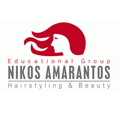Career Colleges and Vocational Schools in Greece

Nikos Amarantos, Hair Education and Beauty
Athens, Greece
Nikos Amarantos is the person, who founded the first hairdressing school in Greece in the fifties. It was formed as a small technical school, which has grown to train thousands of professionals from the country and abroad. The institution was the first to initiate educational visits abroad where graduate students have the opportunity to learn about the latest trends and fashions in hairdressing in detail. Regular trips are organized to Italy, France, and England, while students can also take advantage of a great mix of theory and practice. Practical training and methodology are made... See full description.

The Aegean Center for the Fine Arts
Paros, Greece
The Aegean Center was founded in 1966 in Paros, Greece, as an independent, non-profit institution, which offers specialized study in the visual arts, creative writing, and music. Campuses are located in both the Aegean Islands of Greece, and Tuscany, Italy. During the Spring Term, classes are held at a restored Neoclassical facility in Paros, in the heart of a historical market street, while Fall term classes can be attended in both Greece and Italy. Students in Italy have the privilege to study in 16th Century Tuscan villa in the hills above Pistoia, 30 kilometers from Florence.
The... See full description.
Career Colleges and Vocational Schools in Greece by City:
AthensParosAbout Career Colleges and Vocational Schools in Greece
In Greece, the Organization for Vocational Education and Training (OEEK) is the association that supervises and governs vocational institutes. This organization provides accreditation to all forms of formal vocational training. Vocational education in Greece is usually provided by the I.E.K institutes of vocational training in Greece. They are of both public and private nature. Such vocational education is provided after basic schooling.
Vocational education in Greece may be of two types:
Admission
To obtain admission into vocational education institutes, a student must be over 18 years in age. He or she also needs to possess a Lower Secondary School Certificate, in the least, to enroll at an IEK. Admissions and the selections for the 1st semester in State IEKs happens twice a year; early September for the winter semester and late January for the spring semester. Students are graded and selected into IEKs based on several criteria, such as, school grades, age, relevant work experience and size of family. Students, who enroll for vocational education, are generally reluctant to continue in higher education institutions, and are seeking a quick entry into the labor market.
Duration
In case of students from upper secondary school or (Geniko Lykeio), vocational education lasts four semesters. Students coming from EPAL and EPAS, on the other hand, maintain their previous specialization and need to attend only two semesters only.
Course and Examination Structure
Vocational institutions in Greece offer around 200 specializations. These subjects are classified into fourteen main fields; Information technology, telecommunications, networks, financial and administration services, food and drink, Transport and tourism, electronics, electrics, engineering, construction, industrial chemistry, applied arts, energy, environment, health, cosmetics, social services, communications and mass media, clothing and footwear, culture and sport and agriculture.
Students are tested and assessed every semester. Students are also required to take a final examination in each course at the end of every semester. Students are graded on a scale of one to twenty. Upon successful completion of vocational training in Greece, candidates are awarded a Vevaiosi (Certificate) of Vocational Training (BEK).
Upon obtaining the BEK, graduates are required to take additional examinations in order to obtain a Vocational Training Diploma or Certificate. These abovementioned examinations are held two times a year, and the candidates are assessed by the Central Examination Committee for Vocational Training Certification ΚΕΕΠΕΚ) and the Regional Certification Examination Committees (PEEP).
Vocational education in Greece may be of two types:
- Vocational Non-compulsory Secondary Education (Vocational Lykeio & Vocational School)
- The other (as has been mentioned previously) is part of post-secondary non-tertiary education, specifically vocational training institutes or I.E.K institutes.
Admission
To obtain admission into vocational education institutes, a student must be over 18 years in age. He or she also needs to possess a Lower Secondary School Certificate, in the least, to enroll at an IEK. Admissions and the selections for the 1st semester in State IEKs happens twice a year; early September for the winter semester and late January for the spring semester. Students are graded and selected into IEKs based on several criteria, such as, school grades, age, relevant work experience and size of family. Students, who enroll for vocational education, are generally reluctant to continue in higher education institutions, and are seeking a quick entry into the labor market.
Duration
In case of students from upper secondary school or (Geniko Lykeio), vocational education lasts four semesters. Students coming from EPAL and EPAS, on the other hand, maintain their previous specialization and need to attend only two semesters only.
Course and Examination Structure
Vocational institutions in Greece offer around 200 specializations. These subjects are classified into fourteen main fields; Information technology, telecommunications, networks, financial and administration services, food and drink, Transport and tourism, electronics, electrics, engineering, construction, industrial chemistry, applied arts, energy, environment, health, cosmetics, social services, communications and mass media, clothing and footwear, culture and sport and agriculture.
Students are tested and assessed every semester. Students are also required to take a final examination in each course at the end of every semester. Students are graded on a scale of one to twenty. Upon successful completion of vocational training in Greece, candidates are awarded a Vevaiosi (Certificate) of Vocational Training (BEK).
Upon obtaining the BEK, graduates are required to take additional examinations in order to obtain a Vocational Training Diploma or Certificate. These abovementioned examinations are held two times a year, and the candidates are assessed by the Central Examination Committee for Vocational Training Certification ΚΕΕΠΕΚ) and the Regional Certification Examination Committees (PEEP).

